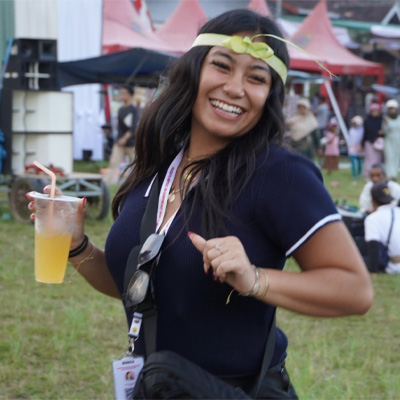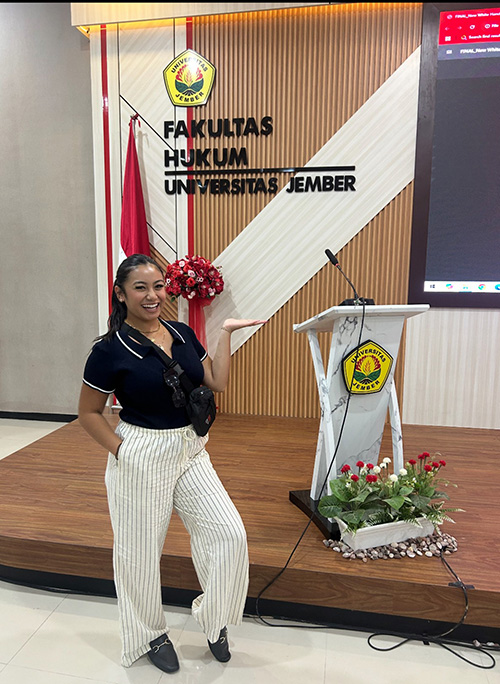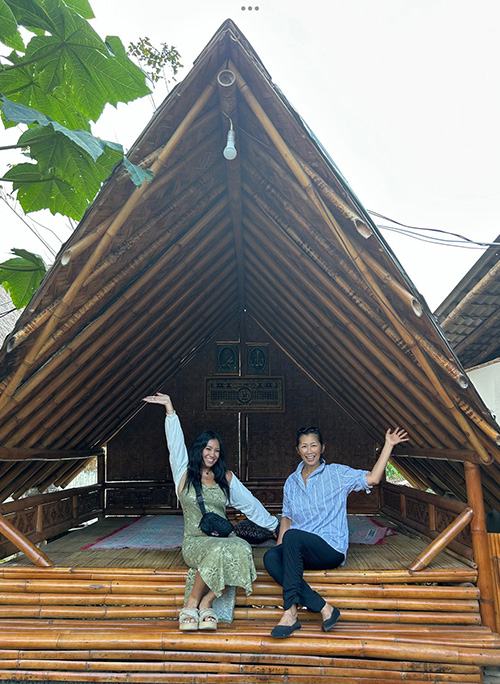Student Highlights
Lola Fregoso: 2025 Asian Studies Outstanding Graduating Senior
Lola Fregoso was selected as our Asian Studies outstanding graduating senior in 2024.
Fregoso named Linguistics Professor Zheng-sheng Zhang the most influential faculty. Fregoso and Professor Zhang joined the dean’s platform at CAL commencement.
Fregoso’s Perspective
Entering SDSU as an undeclared freshman and realizing I couldn’t stay in an arbitrary and undefined realm of academia forever, it seems that I ‘fell into’ more than ‘found’ Asian Studies. Being a bit lost after a high school experience heavily flavored by COVID-19, the main goal I had in mind was to study Chinese; a language that was part of my heritage yet was never taught to me. The resulting explosion of passion led to astounding amounts of support from my professors, an internship opportunity at a Chinese historical museum, and learning experiences on the other side of the globe.
Speaking of the other side of the globe, never in my life would I have guessed that school could take me to such faraway places. Yet, somehow I managed to survive the hottest and most humid time of the year living as an international student in Taipei, Taiwan. While there I attended a language program that forbade speaking any English, where my chosen form of studying was to just memorize the textbook so I could recite it if need be.
Asian Studies sending me to countries I hadn’t given much thought to before also helped me to learn a lot about myself and my heritage. Taking advantage of a 3-day weekend while studying in Taiwan, a quick trip to Hong Kong turned into a much deeper personal experience. I stood at the gate of a tall new building, where once stood the apartment that my grandmother grew up in. I turned around to look at the street she must have played on with her siblings, except now it was more akin to a highway. Because of her sacrifices, here I was in the very same place as a tourist.
As this year’s Asian Studies Outstanding Graduating Senior, the SDSU faculty member that I decided to represent me was Dr. Zheng-sheng Zhang, a professor who only taught me academically for two semesters but who has continued to teach me in other ways. Initially intimidated by his extensive linguistic research, his tenure as a Chinese teacher, and his habit for correcting students’ homework on the projector in front of the entire class, he eventually showed me how to hold myself to a higher standard in order to earn respect from those around me. My accomplishments were not only my own, but rather a collaboration by all those who have supported me– and who better to choose than the person who finally got me to understand how to use “把” in Chinese?
Looking back, I am grateful for everything this school has taught me. I learned about myself both academically and socially, and I have made relationships with the best possible group of people. Yes, it was difficult, but living a life with challenges has led me to look forward to a life in which I am prepared to face anything that comes next.
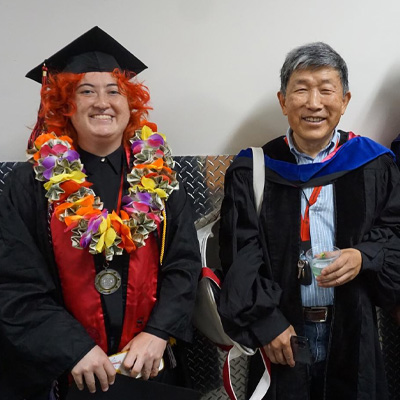
Nya Kim: IS3D major with Asian Studies as an area and CAPS student assistant (2024-2025)
Kim's Perspective
I chose to pursue Asian Studies after transferring from Public Health to Interdisciplinary Studies. During my early education, I received limited exposure to Asian history and culture which motivated me to take advantage of this opportunity to learn more. The wide range of courses offered at SDSU allowed me to explore these subjects in depth. As a result, my awareness and appreciation for Asian cultures have grown significantly.
My time at CAPS was brief but incredibly impactful in shaping my college experience. As a commuter student, I often struggled to find a sense of belonging on campus. I wasn’t someone who easily put myself out there or attended club events, so building community felt challenging. When I discovered the opportunity to work at CAPS, it offered exactly what I had been searching for: financial support, a cultural community, and a genuine reason to get involved on campus.
Looking back, I’m deeply grateful for all that CAPS has given me. It connected me with the Asian Studies community, introduced me to coworkers who became friends, and allowed me to form professional relationships with faculty and staff. It became a space where I could grow, reflect, and build confidence as I prepared for the workforce. Most importantly, CAPS gave me a sense of purpose and stability. I looked forward to coming into the office each day, engaging with fellow students, sharing cultural snacks, and welcoming new faces at every event.
I learned that if you’re curious about culture, you have to lean into that curiosity. I realized that there is so much to discover—heritage, stories, values, and practices that often go unnoticed. Exploring cultural roots is not only a personal journey but also a way to keep traditions alive and meaningful.
During my time here, CAPS grew into a space, filled with meaningful events, thoughtful conversations, and opportunities to celebrate culture and connection. I feel incredibly fortunate to have played a role in shaping this community. I’ve witnessed it in students bonding over shared experiences, in conversations sparked by stories of travel across Asia, and in the simple joy of sharing a meal between cultures and generations. CAPS gave me a community like that, and for that, I’ll always be grateful.
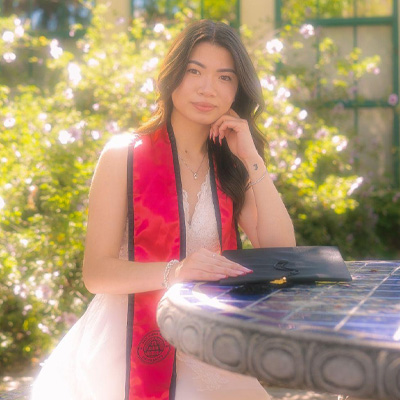
Meleana Love Suarez: Political Science major and Asian Studies minor
My Study Abroad Experience
I have always dreamed of going to Asia and helping others since I was 10 years old. I am beyond grateful to get a scholarship to study abroad in Indonesia at the University of Jember this summer taking a class on access to justice in Southeast Asia. Along with attending a Human Rights Conference in Surabaya. From meeting with Indigenous people like Tengger and Osing Tribe, to going to Islamic boarding schools, to talking with women who are migrant care workers, to working with OGAWA community which is the LGBTQ community and seeing how they advocate for the access of medication in HIV and aids; I have learned so much.
In the Islamic boarding schools, we went to Universitas Islam Cordoba in Banyuwangi where we got to meet students, see the dorms the children live in, have a Q&A session, and share food. When meeting the children from the Islamic boarding school, they were filled with so much excitement and joy. The girls rushed up to me asking to take pictures, making me feel welcomed, and expressing their gratitude to meet and see a foreigner.
While being in Indonesia, we were able to go to two different indigenous tribes. This includes the Tengger which is a Hindu community in East Java and Osing Tribe which is from Banyuwangi. For Tengger we were able to celebrate the village ceremony with them by dressing in traditional clothing, participating in a Hindu ceremony, offering a wide variety of fruits and vegetables, and even getting to ask the village chief many questions. I learned that the Tengger community is struggling to keep their traditions alive especially among the younger generations, that’s why they emphasize the importance of continuing tradition. In the Osing tribe, we were able to participate and learn indigenous Osing style dancing, and climb up bamboo made treehouses. I learned how they educate younger generations about the Osing culture. They created a school to educate young children and keep their traditions alive.
Not only did this program have experiential learning, but we also got to learn from professors and experts in their field. In class I learned about the impacts of child marriages on young women and how that is a major issue in Indonesia today, leading to a lot of high school dropouts, and even higher divorce rates. I also learned how leprosy is a disease that is still occurring in Indonesia, and how in certain communities access to medication can be very rare. At the Human Rights Conference in Surabaya I learned the importance of advocating for a sense of freedom of religion to be practiced within schools.
One of my favorite experiential learning was getting to meet and talk with overseas migrant care workers. These women make eco print clothing using leaves, and natural dye like tumeric. The migrant care workers have to go overseas or go abroad to find work, but have to leave their family behind, because it’s too expensive. Many times they are exploited by their brokers and don’t know their rights causing themselves to be open to abuse. This includes not getting paid,and forced to work long contracts. One woman shared that she had to leave her 18 month old baby and he told her when he grew up that, “Growing up I don’t feel like your my mom”! One woman went to jail for not obeying her boss and had to ask the Indonesian Embassy in Dubai to help her. They seek to educate women who want to work as migrant workers and provide and raise money through their clothing. They believe by teaching women their rights, and standing up from abuse, they can spread awareness. I got the privilege of making their eco print clothing and connecting with the women.
As I continued my trip in Jember, the connection I made with everyone from the program was undeniable. From riding motorbikes on the streets of Jember, to singing “Baby” by Justin Bieber in Karaoke rooms, to celebrating birthdays, to drinking matcha in coffee shops, and trying new coffee shops, I have never met more genuine people in my life. Even to this day, I keep in contact with my friends via Whatsapp sending each other videos encouraging each other to chase our dreams. At the end of the course I had everyone write letters in the jars to the volunteers filling the jars with candy, paper cranes, and letters of appreciation. This is because we may see each other again or we may not, but know the love and care we all had for each other is real.
I realized from all the ceremonies and religions I visited and saw, that at the end of the day we are all people. People who need love, people who need to be told they are enough. That’s why I say this program not only taught me, but showed me how I want to continue that love and spark to one day go back to Asia.
Despite our differences in religion, learning to understand one another, and respect each other is so important. Despite everything happening in this world, I learned love can be shared no matter who it is. We may have different religions, but a universal language can be love and kindness. The more time we take to understand each other, we can see the beauty in who we all are. Our struggles, our pain, our sadness, and our joy! Everyone I met at UNEJ is truly a blessing to me, a gift from God. This year may have been tough, but I know my tita is always watching me, looking down from Heaven saying, “Be the voice for others who don’t have a voice, you have to fight and showcase love because this world is tough.
